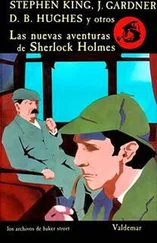“I would not like to raise your hopes just yet, but I would be happy to look into the case, if I may.”
“Oh, yes,” Mrs. Penny said eagerly. “Please do! Even if you learn the worst. Well, I can’t bear to think of life without her by my side.”
Holmes rose, and Malloy and I followed his lead. We took our leave of the Pennys, and the maid showed us to the door. “Are you a maid of all work here?” Holmes asked as she handed us our hats.
She stiffened, ready to take offense at whatever this Englishman might say to her. “Yes, sir, I am.”
“And did you serve Miss Penny?”
“I did, and a sweeter lady there never was.”
“Would you do me a favor and look through Miss Penny’s clothes?”
“Whatever for?” she asked, not sure if she should do his bidding or not.
“Just to see if you find anything unusual.”
“Do you mean if there’s anything missing?” the girl scoffed. “Nobody’s touched her things since she left that morning. I saw to that!”
“I believe you are mistaken,” Holmes said. “If you will check her things, you will discover something unexpected. We will most likely call again tomorrow, and you can report to me then what you have discovered.”
The girl frowned, obviously determined to show the Englishman he was wrong, and slammed the door a little too loudly behind us.
“I told you they wouldn’t be able to help,” Malloy reminded us.
“On the contrary, they were very helpful.”
“Are you saying you know where the girl is?”
“I believe I do,” Holmes said, shocking him. “I must return to my hotel and make some enquiries and send a telegram. As soon as I have received a reply, I will ask you to accompany us back to the manse to see the Pennys again.”
A skeptical Malloy left us to find our own way back to our hotel. Holmes used the hotel telephone to make one call. Then he sent a telegram, as he had told Malloy he would. Since the day was still young, Holmes insisted that we visit the Natural History Museum. Although I asked him about the case, he declined to discuss it until he had received the answer to his telegram. The reply came shortly after luncheon the next day, and Holmes sent a message to Malloy. We arrived at the Pennys’ home late that afternoon, with Holmes still refusing to enlighten Malloy or me until he had spoken with the Pennys.
The same maid admitted us, but today she treated Holmes with much more respect. She whispered a few words to him, her eyes wide with surprise over whatever news she was delivering. He nodded, as if he had expected to hear exactly what she told him, then allowed her to show us in to see the Pennys.
They were waiting for us in the crowded parlor again, their expressions expectant.
“Have you found her, Mr. Holmes?” Mrs. Penny demanded anxiously. “Is she all right? Will you bring her back to us?”
“Now, Mother, you mustn’t get your hopes up,” Penny cautioned her with a worried frown. “Even should Mr. Holmes succeed in returning her to us, she may no longer be the same girl she was, you know.”
“I believe I can guarantee she will not be,” Holmes said, startling a gasp from Mrs. Penny. “Although I am happy to tell you that your daughter is safe and in good health.”
“But where is she?” Mrs. Penny cried. “And why hasn’t she come home?”
“Because she left of her own free will and has no desire to return.”
This time both of Harriet Penny’s parents gasped. “That’s impossible!” her father exclaimed angrily. “We know her disappearance could not have been voluntary.”
“Not only was it voluntary, it was carefully planned. Shall I explain?”
“You had better, before I throw you out of my house!” Penny said, his handsome face mottled with fury.
“First of all, Miss Penny had arranged to be alone at the church that morning.”
“How could she have done that?” Mrs. Penny asked.
“She had told the other two ladies they were to meet the following day, thereby ensuring they would not be at the church that morning. Then she suggested to you, Mrs. Penny, that you should return home and spare yourself the unpleasant task of sorting old clothes. No doubt she knew you could be easily persuaded to do so.”
Mrs. Penny had no reply to this. She just stared at Holmes in silent outrage.
“When she was truly alone and unobserved, perhaps for one of the few times in her life, she left the church, walked to Union Station, and boarded a train for San Francisco.”
The Pennys both protested vigorously, and even Malloy had to disagree.
“Nobody saw her leave the church,” Malloy informed Holmes. “We asked everybody in the neighborhood.”
“What exactly did you ask them?” Holmes asked.
“If they had seen a young woman leaving the church with a man.”
“But she didn’t leave with a man, and she wasn’t forced or doing anything to call attention to herself. She would have walked calmly out and disappeared into the crowd. No one in that alley would have paid the slightest heed to her, just as they paid no heed to us yesterday.”
“My daughter would never have left her home and family, much less boarded a train to anywhere at all!” Penny insisted. “She would never have caused her mother and me so much concern!”
“And why would she go to San Francisco?” Mrs. Penny asked. “We don’t know anyone there at all!”
“Yes, you do. Mr. Etheridge lives in San Francisco. He accepted a call to a church there after he left Princeton.”
“Etheridge? How would Harriet have known he was there? And why would she even have cared?” her father scoffed.
“I believe Miss Penny had developed a fondness for Mr. Etheridge, and he for her.”
“Impossible!” Penny insisted.
“And they had corresponded in the months since he returned to the seminary.”
“I would have known if she was corresponding with anyone!” Mrs. Penny wailed.
“Mr. Penny himself told us she corresponded with missionaries,” Holmes reminded them. “She could have easily included her letters to Etheridge in those mailings and received replies in the same way.”
“But… ” Mrs. Penny cast about desperately for another argument to refute Holmes’s claims. “She couldn’t possibly have left voluntarily. She didn’t take so much as a hairpin with her!” she tried.
“You yourself told me she was carrying a bundle of clothing when you left the house that morning,” Holmes reminded her.
“Secondhand clothing,” Mrs. Penny explained. “She collected it from our neighbors. I saw it myself!”
“But you told me you didn’t see her sorting the clothes in that particular bundle. Would you ring for your maid, please?”
Startled at the seemingly incongruous request, Penny pulled the bell rope. The maid appeared almost instantly, her eyes still wide with amazement.
“Before we left yesterday,” Holmes said, “I asked your maid to go through Miss Penny’s clothing to see if anything was missing. Were her drawers empty?” he asked the girl.
“No, sir, they were all full, just like they should be.”
“You see,” Mrs. Penny said. “I told you!”
“Did you notice anything unusual?” Holmes asked the girl, ignoring Mrs. Penny.
“Yes, sir,” the maid said, nodding her head vigorously. “None of the clothes in the drawers was hers!”
“Whose were they?” Holmes asked.
“I don’t know,” the girl said, “but they was all raggedy and old, like something you’d throw out.”
“Or send to the missionaries in foreign lands,” Holmes said.
“What are you talking about?” Mrs. Penny cried.
“Miss Penny had packed her belongings in the bundle that was supposed to be clothing for the missionaries and left the old clothing she had collected in her drawers. I am guessing she had secreted a carpetbag in the church at some time in preparation. When you left the church that morning, she put her own belongings that she had carried from home into it, and took it with her to the train. Then she used the ticket Mr. Etheridge had sent her and went to join him.”
Читать дальше












